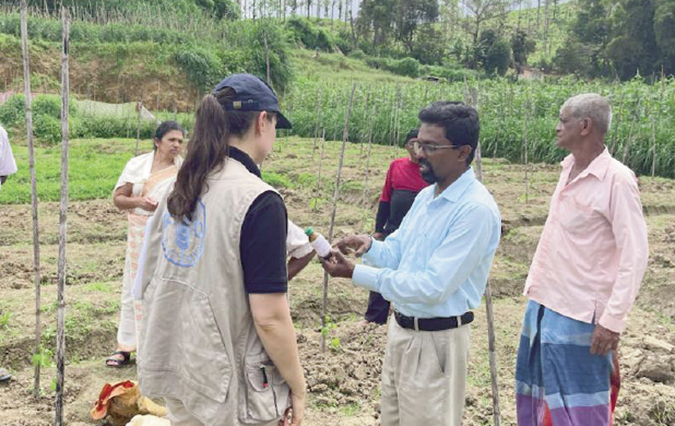FAO/WFP Crop and Food Security Assessment Mission (CFSAM), has recommended to the government to make available fertilisers to farmers to strengthen the ongoing Yala production and to make urgent provisions to ensure fertiliser availability for the 2023/24 Maha season.In a recent report, following the mission, the FAO/WFP said fertilisers are available in stock, and thus all three straight fertilisers (Urea, MOP, and TSP) should be made accessible to farmers to strengthen the 2023 Yala season.
The mission also recommended transferring the responsibility of paddy fertiliser imports and distribution to the private sector, guided by a newly established fertiliser task force, under the President’s office, from the 2023/24 Maha season onward.
They also urged the government to guarantee policy directions with clear, formal communication to both farmers and input importers/distributors and to scale up nationwide the electronic fertiliser voucher support mechanism, targeted to paddy smallholder farmers.
“Retain the crop insurance scheme as the primary agricultural risk transfer mechanism during the transition period, with a gradual shift towards a weather index-based insurance scheme, particularly for the dry zone, instead of blanket schemes for the entire country,” the mission recommended.
FAO/WFP also urged the government to initiate applied research to explore, adapt and expand climate-smart agriculture practices and technologies for sustainable crop intensification.
“Given the country’s historical dependence on fertiliser subsidies, there is a need to catch up on implementing sustainable farming methods. The mission has identified certain high-potential for climate smart agriculture practices. These practices aim to assist farmers in maintaining and enhancing soil fertility through the production of their own compost and nitrogen fertiliser and optimizing the use of chemical fertilisers, thereby reducing the needs and the import bill of chemical fertilisers,” the mission said.
The UN agencies also recommended the government to encourage farmers to transition to nitrogen-fixing legume crops, such as soybeans, in well-draining paddy areas to enhance water efficiency and soil fertility. In water-abundant regions, introduce early maturing crops like green gram, black gram or cowpea after the paddy harvest to utilize residual moisture. Legume fodder crops could also complement the paddy harvest, strengthening the connection between livestock and soil fertility.
The mission also asked the government to offer guidance and financial incentives for farmers to produce their own compost using livestock manure, crop residues and local biomass. The government must also implement penalties for burning crop residue biomass.
The mission said that it was important to facilitate the transfer of value addition along the supply chain to paddy smallholder farmers.
“During the crisis, paddy farmers seem to be losing influence in the value chain, while downstream actors are capturing a greater share of the value addition. Scale up the negotiable warehouse receipt system. Expand the negotiable warehouse receipt system to counter seasonal paddy price fluctuations exploited by intermediaries. This system, promoted by Regional Development Banks in Sri Lanka, allows farmers to store their produce securely and use the receipts as collateral for bank loans, enabling them to sell their harvest later at higher prices. To amplify this approach, consider using the government’s existing food storage capacity of 350 000 tonnes across 20 districts,” the report said.































